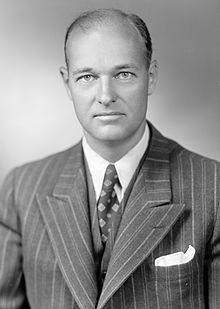
Back George F. Kennan Afrikaans جورج كينان Arabic جورج كينان ARZ George F. Kennan AST Джордж Фрост Кенан Byelorussian Джордж Фрост Кенан Bulgarian George Frost Kennan Catalan George Frost Kennan Czech George F. Kennan Danish George F. Kennan German
George F. Kennan | |
|---|---|
 Kennan in 1947 | |
| United States Ambassador to Yugoslavia | |
| In office May 16, 1961 – July 28, 1963 | |
| President | John F. Kennedy |
| Preceded by | Karl L. Rankin |
| Succeeded by | Charles Burke Elbrick |
| United States Ambassador to the Soviet Union | |
| In office May 14, 1952 – September 19, 1952 | |
| President | Harry S. Truman |
| Preceded by | Alan G. Kirk |
| Succeeded by | Charles E. Bohlen |
| 8th Counselor of the United States Department of State | |
| In office August 4, 1949 – January 1, 1950[1] | |
| President | Harry S. Truman |
| Preceded by | Charles E. Bohlen |
| Succeeded by | Charles E. Bohlen |
| 1st Director of Policy Planning | |
| In office May 5, 1947 – May 31, 1949 | |
| President | Harry S. Truman |
| Preceded by | Office established |
| Succeeded by | Paul H. Nitze |
| Personal details | |
| Born | George Frost Kennan February 16, 1904 Milwaukee, Wisconsin, U.S. |
| Died | March 17, 2005 (aged 101) Princeton, New Jersey, U.S. |
| Spouse |
Annelise Sorensen (m. 1931) |
| Alma mater | Princeton University (AB) |
| Profession |
|
George Frost Kennan (February 16, 1904 – March 17, 2005) was an American diplomat and historian. He was best known as an advocate of a policy of containment of Soviet expansion during the Cold War. He lectured widely and wrote scholarly histories of the relations between the USSR and the United States. He was also one of the group of foreign policy elders known as "The Wise Men".
During the late 1940s, his writings confirmed the Truman Doctrine and inspired the U.S. foreign policy of containing the USSR. His "Long Telegram" from Moscow in 1946 and the subsequent 1947 article "The Sources of Soviet Conduct" argued that the Soviet regime was inherently expansionist and that its influence had to be "contained" in areas of vital strategic importance to the United States. These texts provided justification for the Truman administration's new anti-Soviet policy. Kennan played a major role in the development of definitive Cold War programs and institutions, notably the Marshall Plan.
Soon after his concepts had become U.S. policy, Kennan began to criticize the foreign policies that he had helped articulate. By late 1948, Kennan became confident that the US could commence positive dialogue with the Soviet government. His proposals were dismissed by the Truman administration, and Kennan's influence waned, particularly after Dean Acheson was appointed Secretary of State in 1949. Soon thereafter, U.S. Cold War strategy assumed a more assertive and militaristic quality, causing Kennan to lament what he believed was an abrogation of his previous assessments.[citation needed]
In 1950, Kennan left the State Department—except for a brief ambassadorial stint in Moscow and a longer one in Yugoslavia—and became a realist critic of U.S. foreign policy. He continued to analyze international affairs as a faculty member of the Institute for Advanced Study from 1956 until his death in 2005 at age 101.